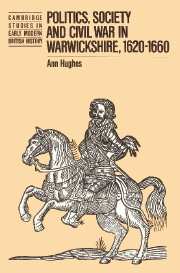Book contents
- Frontmatter
- Contents
- List of maps and plan
- List of tables
- Preface
- Acknowledgements
- Abbreviations and notes
- 1 The social context
- 2 Peers and gentlemen before the Civil War
- 3 Public affairs 1620–1639
- 4 The coming of the Civil War 1639–1642
- 5 Military rule 1642–1649
- 6 Militancy and localism in Warwickshire politics 1643–1649
- 7 The impact of the Civil War
- 8 Politics and religion 1649–1662
- Appendix 1 Local governors 1620–1660
- Appendix 2 Active county committeemen 1643–1647
- Bibliography of manuscript and printed sources
- Index
6 - Militancy and localism in Warwickshire politics 1643–1649
Published online by Cambridge University Press: 18 December 2009
- Frontmatter
- Contents
- List of maps and plan
- List of tables
- Preface
- Acknowledgements
- Abbreviations and notes
- 1 The social context
- 2 Peers and gentlemen before the Civil War
- 3 Public affairs 1620–1639
- 4 The coming of the Civil War 1639–1642
- 5 Military rule 1642–1649
- 6 Militancy and localism in Warwickshire politics 1643–1649
- 7 The impact of the Civil War
- 8 Politics and religion 1649–1662
- Appendix 1 Local governors 1620–1660
- Appendix 2 Active county committeemen 1643–1647
- Bibliography of manuscript and printed sources
- Index
Summary
Ever since the important work by Alan Everitt on the ‘county community’, political divisions in the counties controlled by Parliament during the Civil War have usually been seen in terms of a conflict between moderates who sought to defend the local community and ‘extremists’ who were nationally minded. In a characteristic formulation David Underdown wrote of ‘the now familiar conflict between nationally minded militants and locally minded moderates [which] can be found in all the parliamentarian counties’. Clive Holmes has mounted the major challenge to this consensus.
It has been recognised that political conflicts in Warwickshire during the Civil War do not fit this ‘familiar’ pattern. In 1643–4 the militant county committee, described in the previous chapter, was apparently the champion of localism, blocking all the efforts of the Earl of Denbigh, the moderate commander in chief of the West Midland Association, to raise an effective army that could contribute to the wider war effort. The interpretation of this paradox is usually that the committee's localism contradicted or limited its militancy. As I have shown in chapter 5, however, the committeemen had compelling military reasons for their localist attitudes and I will show below that politically too, their ‘localism’ was perfectly in harmony with their militancy, rather than in conflict with it. Moreover, Warwickshire politics suggest that a division between localists and those who were nationally minded may not always provide an appropriate analysis. Rather there was a more subtle interrelationship between local and national politics.
- Type
- Chapter
- Information
- Politics, Society and Civil War in Warwickshire, 1620–1660 , pp. 220 - 254Publisher: Cambridge University PressPrint publication year: 1987



